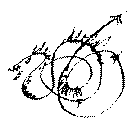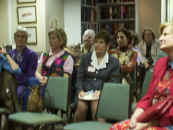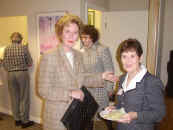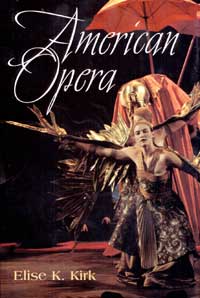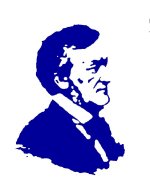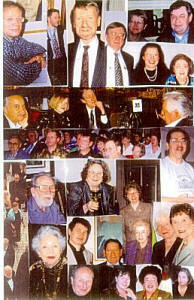|
The
Wagner Society |
|
|
A LECTURE BY
|
WSD EVENTS
|
Wagnerism and the American Muse
Dr. Kirk will trace Wagner's influence on important American opera composers. She will use excerpts from American operas and show how Wagner's musical and dramatic concepts fashioned the creations of American composers.
PROGRAM
Wagnerism and the American Muse
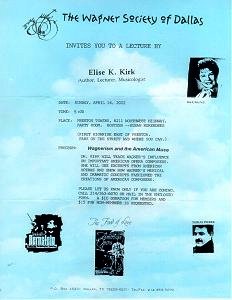 Tired of Tannhauser? Bored with Boheme? Then open your
imagination to the unexpected pleasures of American opera.
Tired of Tannhauser? Bored with Boheme? Then open your
imagination to the unexpected pleasures of American opera.
With this generous, accessible overview, Elise K. Kirk provides a lively history of one of America's liveliest arts. A treasure trove of information on a substantial, heretofore neglected repertoire, American Opera sketches musical traits and provides plot summaries, descriptions of sets and stagings, and biographical details on performers, composers, and librettists for more than 100 American operas, many of which have received unjustifiably scant attention since their premieres.
From the spectacle and melodrama of William Dunlap's Pizarro in Peru (1800) and the pathos of Caryl Florio's Uncle Tom's Cabin (1882) to the chilling psychological drama of Jack Beeson's Lizzie Borden (1965) and the lyric elegance of John Corigliano's The Ghosts of Versailles (1991), opera in America displays the energy and diversity of the nation itself. Kirk shows that this rich, varied repertoire includes far more than familiar jewels such as Porgy and Bess, Candide, Susannah, and The Consul.
Beginning with the English-influenced harlequinade of the revolutionary period, Kirk traces the development of comic opera, the rise of melodramatic romanticism, the emergence of American grand opera and verismo, and the explosion of eclectic forms that characterized American opera in the twentieth century. Devoting particular attention to the accomplishments of women and black composers and librettists, Kirk explores how American operas have incorporated indigenous elements such as jazz, popular song, folk music, Native American motifs, and Hollywood's cinematic techniques. She also discusses the impact of radio and television broadcasting on opera in America, the advent of opera workshops in universities, the integration of multimedia effects into recent opera productions, and innovations such as co-commissioning and joint staging that have helped sustain American opera as federal support has declined.
An engaging introduction for neophytes, American Opera also offers an array of welcome surprises for diehard opera fans.
|
American Opera
2001 |
 Elise
K Kirk, Ph.D., is an author, lecturer, and musicologist who is widely
recognized for her research in the fields of the performing arts and American
cultural history. She is founding editor of the award-winning Dallas Opera
Magazine, and coeditor of Opera and Vivaldi. Her articles have
appeared in Opera News, The Magazine Antiques, American Way, the
Library of Congress Performing Arts Annual, Kennedy Center Stagebill, and
numerous other publications. An accomplished pianist and singer, she studied at
the University of Michigan, Catholic University of America, and the University
of Zurich, Switzerland.
Elise
K Kirk, Ph.D., is an author, lecturer, and musicologist who is widely
recognized for her research in the fields of the performing arts and American
cultural history. She is founding editor of the award-winning Dallas Opera
Magazine, and coeditor of Opera and Vivaldi. Her articles have
appeared in Opera News, The Magazine Antiques, American Way, the
Library of Congress Performing Arts Annual, Kennedy Center Stagebill, and
numerous other publications. An accomplished pianist and singer, she studied at
the University of Michigan, Catholic University of America, and the University
of Zurich, Switzerland.
Dr. Kirk has received many awards for her research and writing, most recently from the Hoover Presidential Library Association and the American Society of Composers, Authors, and Publishers for her book, Music at the White House. As a presidential appointee, she served on the National Advisory Council of the John F. Kennedy Center for the Performing Arts and was the Historical Music Consultant for a documentary film on the White House.
Dr. Kirk's speaking engagements have taken her to Europe, Australia and across the United States, where she consistently receives high acclaim. Currently she teaches music history at Catholic University of America and lectures regularly at the John F. Kennedy Center. She is a member of the Board of Directors of the White House Historical Association and the planning committee for the bicentennial of the White House in 1992.
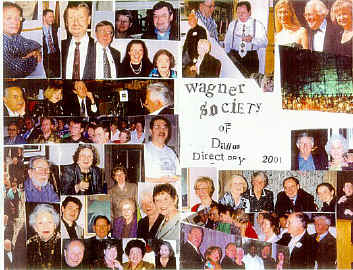

Welcome to The Wagner Society of Dallas. You know, as Texans, we're bound to strive for being the biggest and best of all the Wagner groups in the world over. My hope, in addition, is that we ensure your attendance and participation by offering an interesting, stimulating, and enjoyable array of meetings, recitals, and travel. Let us know if you have suggestions for future activities, and do make an effort to join in during the coming months with your membership, attendance, and above all joy of being with fellow Wagner aficionados. Roger Carroll The Wagner Society of Dallas - Virginia R.
Abdo and Dr. James T. Wheeler, The Wagner Society of Dallas is devoted to furthering the enjoyment and appreciation of the music of Richard Wagner. The Dallas group is one of many Wagner Societies all over the world. It is a non-profit organization open to anyone who enjoys the works of Richard Wagner and who would like to participate in the Society’s activities. The Wagner Society of Dallas has monthly meetings and programs which feature recitals, lectures, video screenings, receptions for opera singers and personalities, and trips to Wagner performances in other cities. We welcome music lovers who are already familiar with Wagner’s works as well as those who may want to become more knowledgeable about Wagner’s music. Member Benefits include attendance at programs, our newsletter, discount on books and CD’s, advance notice of events and selected ticket services, receipt of the Membership Directory, ticket allotments to Bayreuth, and an active link with fellow Wagnerians throughout the world. |
